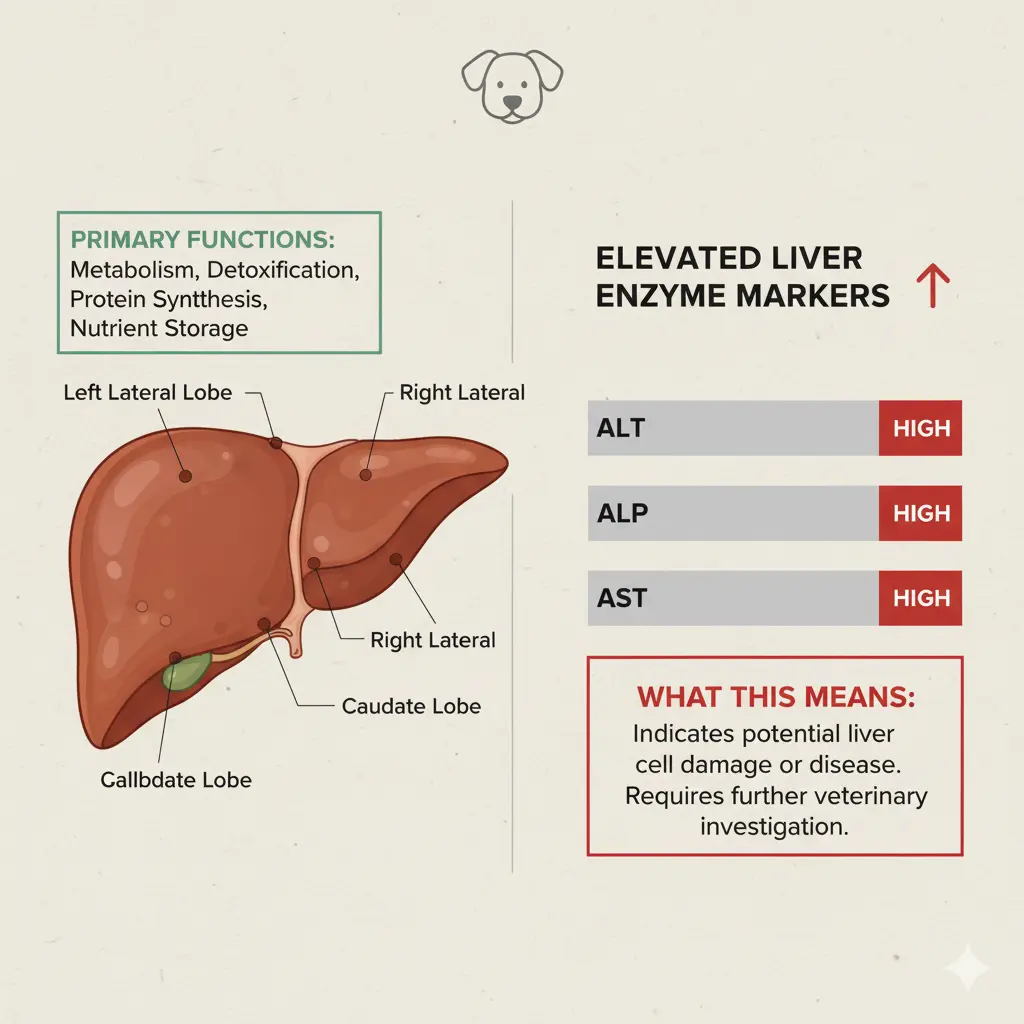Ever gotten blood test results for your dog and noticed that her liver enzyme levels were high? It can feel worrying, and one of the first questions that comes to mind is, “What is the life expectancy of dog with high liver enzymes?”
This is an important and emotional topic for any pet parent. The liver plays a vital role in keeping your dog healthy. It helps with digestion, removes toxins, and supports metabolism. When something disrupts its function, your dog’s overall health can be affected.
In this article, you’ll understand what high liver enzymes mean, what influences the life expectancy of dog with high liver enzymes, and how proper care can help your furry friend live a longer, happier life.
Medical Disclaimer: This article is for general informational purposes only and does not replace professional veterinary diagnosis or treatment. High liver enzyme levels in dogs can indicate a wide range of conditions. Always consult a licensed veterinarian for accurate diagnosis, prognosis, and treatment decisions.

What Do High Liver Enzymes Mean?
Before you explore the life expectancy of dog with high liver enzymes, it’s important to know what liver enzymes actually are. These enzymes—such as ALT (alanine aminotransferase), AST (aspartate aminotransferase), ALP (alkaline phosphatase), and GGT (gamma-glutamyl transferase)—help your dog’s liver perform its normal functions.
When these enzyme levels rise, it’s a sign that the liver is under stress. This doesn’t always mean your dog has permanent liver damage. Sometimes, high levels can appear temporarily due to inflammation, medication, or minor infections. However, chronically high levels may point to underlying liver disease or another systemic condition.
Common Causes of High Liver Enzymes in Dogs
Understanding what’s behind these increased numbers can help you grasp the life expectancy of dog with high liver enzymes more clearly. Some typical causes include:
- Infections (bacterial, viral, or parasitic)
- Medications or toxins, such as pain relievers or chemicals
- Fatty liver disease or poor diet
- Tumors or cancerous growths affecting the liver
- Endocrine disorders, like Cushing’s disease or diabetes
- Age-related degeneration of liver cells
Each of these causes affects the liver differently, which is why the life expectancy of dog with high liver enzymes can vary widely depending on root health issues and how quickly they’re treated.

How High Liver Enzymes Affect Life Expectancy
The life expectancy of dog with high liver enzymes depends on multiple factors—severity of liver damage, underlying cause, age, and how early treatment begins. In mild or reversible cases, dogs can may improve significantly with treatment with proper medication, diet changes, and consistent veterinary monitoring.
However, if the cause is chronic liver disease or late-stage damage, the liver’s ability to regenerate may be limited. In such cases, life expectancy can range from a few months to several years, depending on supportive care and overall health management.
Dogs with mild cases often lead normal lives once treatment stabilizes their enzyme levels. Early diagnosis makes a significant difference in extending longevity.
Symptoms You Should Watch For
Recognizing warning signs early is crucial to protecting the life expectancy of dog with high liver enzymes. Common symptoms may include:
- Loss of appetite or sudden weight loss
- Fatigue or lethargy
- Vomiting or diarrhea
- Yellowing of the eyes or gums (jaundice)
- Increased thirst and urination
- Abdominal swelling or discomfort
- Unusual behavioral changes
If you notice these signs, it’s best to contact your veterinarian immediately. Early intervention is the key to improving the life expectancy of dog with high liver enzymes.
When High Liver Enzymes Require Immediate Veterinary Care
Seek veterinary attention immediately if your dog shows severe lethargy, seizures, collapse, persistent vomiting, refusal to eat, worsening jaundice, or sudden behavioral changes.

Diagnostic Tests and What They Reveal
To accurately assess the life expectancy of dog with high liver enzymes, your vet may run a few essential tests. These can include:
- Blood tests: To check for enzyme levels and organ function.
- Ultrasound or X-rays: To look for tumors, scarring, or inflammation.
- Liver biopsy: To confirm liver disease or identify infections.
- Urinalysis: To see how well the liver removes toxins.
These diagnostic tools help your vet understand whether the liver is temporarily stressed or permanently damaged.
you may like – Why Does My Dog Lick Me When I Pet Her? The Real Reasons Behind This Adorable Habit
Treatment plans vary widely and must always be determined by a veterinarian based on the underlying cause and severity of liver involvement.
Treatment Options for Dogs with High Liver Enzymes
Once diagnosed, treatment can significantly improve the life expectancy of dog with high liver enzymes. The main goal of treatment is to reduce liver stress, support healing, and prevent further damage. Some common treatments include:
- Medication: Such as antibiotics (for infections), anti-inflammatory drugs, or supplements like SAM-e and milk thistle to promote liver regeneration.
- Dietary management: Low-fat, high-protein diets with easy-to-digest ingredients help the liver recover faster. Specialized liver-support diets are often prescribed.
- Fluid therapy: Helps flush toxins and maintain hydration.
- Regular monitoring: Repeat blood tests ensure enzyme levels are under control.
When treatment is started early enough, many dogs recover well and go on to may maintain a good quality of life, comfortable lives.
Never start or stop medications or supplements without veterinary supervision, as improper treatment can worsen liver damage.

Diet and Lifestyle Changes to Support Liver Health
Lifestyle and nutrition can strongly influence the life expectancy of dog with high liver enzymes. Proper diet and care can help maintain liver function and prevent relapse.
Here are a few practical steps you can take:
- Feed a balanced diet: Always opt for vet-approved liver-support food.
- Avoid fatty or processed treats: These can put stress on the liver.
- Keep your dog hydrated: Fresh water helps eliminate toxins.
- Limit exposure to household toxins: Avoid chemical cleaners or certain plants toxic to pets.
- Provide gentle exercise: Regular walks and light play keep her body strong without overexertion.
Consistency is key. A stable routine, combined with regular vet check-ups, will naturally improve the life expectancy of dog with high liver enzymes.
Dietary changes for liver disease should only be made under veterinary guidance, as incorrect nutrition can worsen liver stress.
Realistic Expectations for Life Expectancy
The life expectancy of dog with high liver enzymes varies greatly based on each dog’s unique condition. For mild or treatable causes, your dog can live a normal lifespan—often may approach a normal lifespan depending on the cause, depending on breed and health history.
For dogs with chronic or advanced liver disease, life expectancy may range from several months to a few years with supportive care. What matters most is quality of life—comfort, appetite, energy, and happiness.
Many pet parents find that after starting proper liver treatment, their dogs regain appetite, energy, and enthusiasm for weeks or months, sometimes even years. Hope and consistency can go a long way.

Emotional Care and Support
Physical health isn’t the only thing that influences the life expectancy of dog with high liver enzymes—emotional well-being matters too. Dogs pick up on your emotions. A calm, loving environment helps reduce stress, which indirectly supports recovery.
Spend time with your dog, give gentle affection, and maintain her favorite routines. This stability enhances overall well-being and can extend both her happiness and her life.
When to Revisit the Vet
If you’ve already begun treatment, regular follow-ups are vital for maintaining the life expectancy of dog with high liver enzymes. Your vet might recommend periodic blood work every few months to ensure the liver enzymes are stable.
If your dog’s symptoms return—like fatigue, loss of appetite, or vomiting—make sure to revisit the vet, as her medication or diet might need adjustment.
Conclusion
So, what’s the real life expectancy of dog with high liver enzymes? There’s no single answer, because every case is unique. With early detection, proper treatment, and lifestyle adjustments, many dogs can live long, fulfilling lives.
The best step you can take as a pet parent is to stay informed, follow your vet’s advice, and give your dog the consistent care she needs. With your love and commitment, she can continue sharing life’s happiest moments with you—healthier and stronger than before.
Share To Help